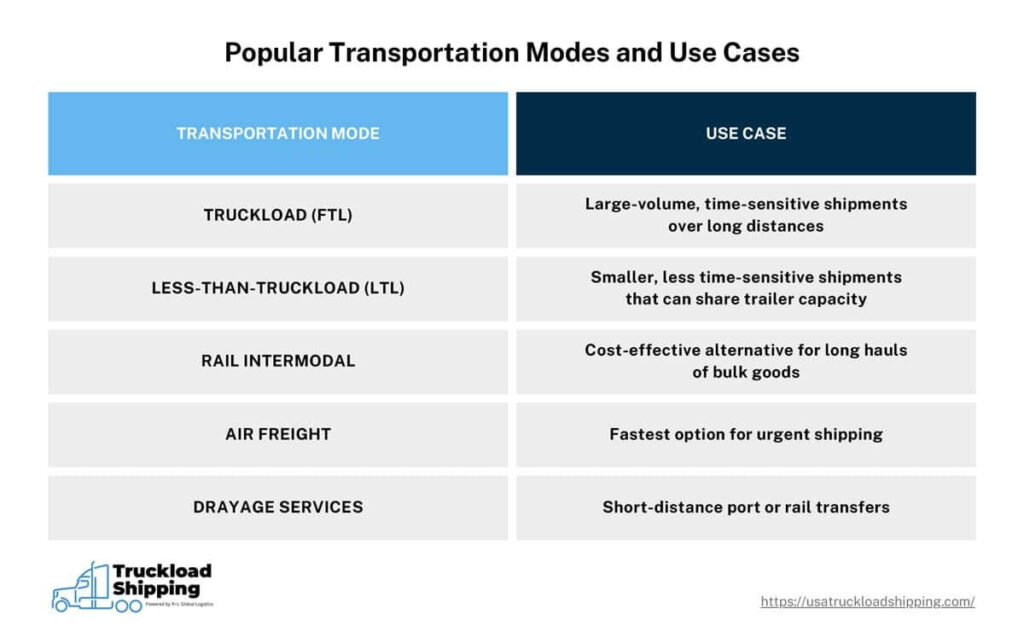Shippers need qualified carriers to deliver their goods across the country, but choosing a carrier can be a confusing and stressful process. Knowing the right questions to ask your freight carrier or freight broker will set you up for success in the highly-competitive U.S. market.
Key Takeaways:
Whether you’re a shipper with freight to move or a carrier looking for new business partnerships, these six questions to ask freight carriers and brokers will help you determine their trustworthiness and expertise.
One of the most important factors in choosing a freight broker or shipping company is the size and strength of its carrier network. A larger carrier network gives shippers access to more transportation options across a greater area, minimizing barriers to operations and ensuring on-time delivery.
Well-established freight brokerage services should be equipped to offer:
In the table below, you can see some of the most cost-efficient uses of different freight transport modes.

A large network of intermodal carriers lets brokers match loads with the most efficient and cost-effective modes of transportation.
As new advances in logistics technology arise, freight brokerage services integrate these to improve shipment visibility, efficiency, and communication for their clients.
Look for a freight provider that offers:
A broker or carrier with advanced freight technology integration helps reduce supply chain disruptions and enhances efficiency by automating key processes.
Some commodities require special consideration during the shipping process. Knowing whether a freight provider has commodity-specific experience ensures your shipment won’t incur fees or get delayed due to its sensitive nature.
Before committing to a 3PL freight broker, ask about:
An experienced freight broker will readily communicate which commodities they can handle and any special considerations required. Keep in mind that some goods will require further vetting from high-level decision makers before any pricing discussion can begin.
If your business ships hazardous materials (hazmat), you need a carrier that understands hazmat classifications and meets FMCSA compliance standards. Hazardous shipments must adhere to Department of Transportation (DOT) regulations, including proper documentation and emergency contact protocols.
Shippers should ensure their freight broker has experience with hazmat shipping, including access to properly certified carriers and emergency response plans.
Related: Guide to Hazardous Waste Transportation
Understanding what’s included in your freight quote requires looking beyond the base rate to see what services are covered under your shipping contract. Transparent pricing avoids unexpected charges and ensures you’re getting the best value for your shipping budget.
Some key pricing factors you should keep in mind are:
A reliable third-party logistics provider (3PL) should offer detailed pricing breakdowns and work with shippers to optimize costs without sacrificing service quality.
Related: What is a Fuel Surcharge?
The FMCSA and DOT work together to regulate and enforce freight transport in the U.S. FMCSA verification is essential when selecting a freight broker or carrier.
Before you work with a freight broker, check for the following information:
You can check FMCSA verification status by searching the carrier’s MC number in the administration’s SAFER System. If a broker or carrier cannot provide proof of compliance, you’ll definitely want to do business elsewhere.
Choosing the right freight broker or carrier is an important step for shippers looking to balance delivery costs with the demands of their customers.
At USA Truckload Shipping, we provide shippers a full suite of 3PL services, including:
Partner with a trusted 3PL provider that prioritizes on-time delivery performance, fair pricing, and compliance with all necessary freight shipment regulations. Call us at (866) 353-7178 or fill out a request for proposal online today!
R+L Global Logistics
315 NE 14th St., Ocala, FL 34470